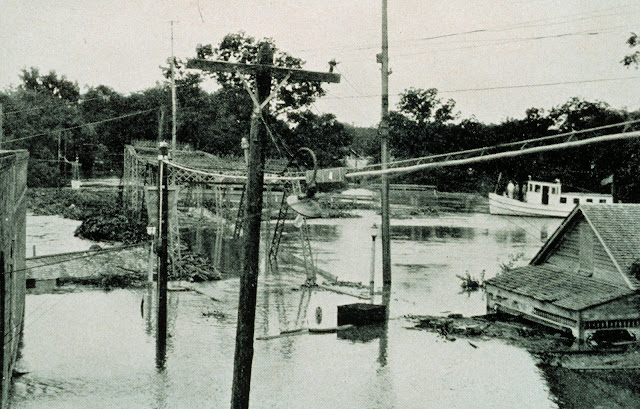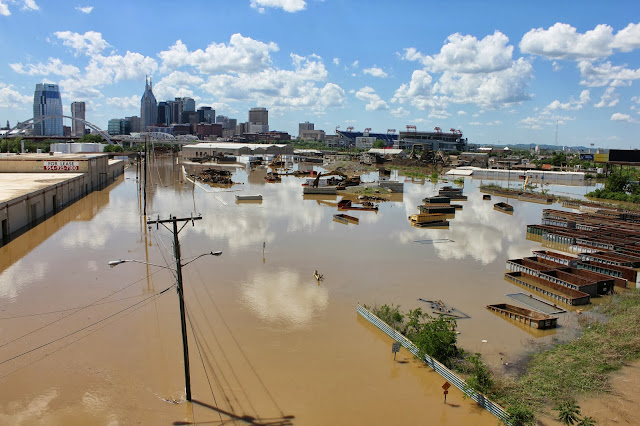Remember when Katrina hit New Orleans, and everyone talked about how it was the biggest natural, social, economic, and political disaster to ever be caused by the weather?
Well, it wasn't.
That dubious honor belongs to the Great Mississippi Flood of 1927.
The Great Flood actually had its origins in 1926, when an unusually high volume of summer rain started testing the capacity of levees all along the Mississippi. By September, tributaries in Iowa and Kansas were ready to burst from their cages. By Christmas, the water level of the tributary Cumberland River had already reached 56.2 feet in Nashville, a record that still hasn't been topped.
Finally, in the Spring of 1927, the levees started to break in earnest. 27,000 square miles of land along the river was devastated by the ensuing floods. That's almost the size of South Carolina. The flood hit areas of Arkansas, Illinois, Kansas, Kentucky, Louisiana, Mississippi, Missouri, Oklahoma, Tennessee, and Texas.
The damage clocked in at over $400 million, and 246 people lost their lives. In some areas, the flooding carried the force and twice the water volume of Niagara Falls. At its widest extent, the Mississippi grew to a staggering 60 miles, which is more than twice the size of the freaking Amazon at its greatest extent. During the wet season.
Politically speaking, the hardest hit area was New Orleans. State officials in Louisiana made some difficult and terrible decisions to protect the city. Decisions that involved literally blowing up nearby levees and intentionally flooding the Parishes of St. Bernard and Plaquemines. Then it got even messier.
The people of St. Bernard and Plaquemines were understandably a little miffed about having their homes destroyed by elected officials. That annoyance would later turn to downright anger when it turned out that the effort was entirely unnecessary anyway, and New Orleans had already been spared. Natural breaches in other levees relieved pressure on the levees around New Orleans, so their involuntary sacrifice was in vain.
Then it gets even messier.
At the time, most citizens of St. Bernard and Plaquemines were focusing on the whole "not drowning" part of daily life rather than the "whose fault is this" part. The government was happy to help with that, so long as you were white. If you were black, you had to wait your turn. Then you had to spend some time in a refugee camp with the kind of hospitality you would expect from House Frey.
Then you would never, ever receive a dime of promised federal aid. And you'd be forced at gunpoint to rebuild levees. For some reason, "forced to work" and "not receiving a dime" sounds familiar in this context.
It was kind of shitty.
So the Republican Party sprang into action. They were in power at the time, and then Secretary of Commerce Herbert Hoover had his eye on the White House for 1928. By promising a major effort for reform and the introduction of civil rights legislation, he was able to keep the story somewhat sub rosa. After he was elected, he weaseled his way out of it and started the grand tradition of the Republican Party losing the black vote -- a tradition which continues to this day.
The aftermath of the flood in the black community is also considered one of the main catalysts for the Great Migration, which eventually saw over 6 million black people pack up their shit and get the hell out of Dixie. It was one of the biggest internal demographic shifts in U.S. History, and it was more or less caused by the rain.
Holy shit.
The damage clocked in at over $400 million, and 246 people lost their lives. In some areas, the flooding carried the force and twice the water volume of Niagara Falls. At its widest extent, the Mississippi grew to a staggering 60 miles, which is more than twice the size of the freaking Amazon at its greatest extent. During the wet season.
 |
| Take a close look at the map. It's big. |
Politically speaking, the hardest hit area was New Orleans. State officials in Louisiana made some difficult and terrible decisions to protect the city. Decisions that involved literally blowing up nearby levees and intentionally flooding the Parishes of St. Bernard and Plaquemines. Then it got even messier.
 |
| Helpful. |
The people of St. Bernard and Plaquemines were understandably a little miffed about having their homes destroyed by elected officials. That annoyance would later turn to downright anger when it turned out that the effort was entirely unnecessary anyway, and New Orleans had already been spared. Natural breaches in other levees relieved pressure on the levees around New Orleans, so their involuntary sacrifice was in vain.
Then it gets even messier.
At the time, most citizens of St. Bernard and Plaquemines were focusing on the whole "not drowning" part of daily life rather than the "whose fault is this" part. The government was happy to help with that, so long as you were white. If you were black, you had to wait your turn. Then you had to spend some time in a refugee camp with the kind of hospitality you would expect from House Frey.
 |
| Heh. |
Then you would never, ever receive a dime of promised federal aid. And you'd be forced at gunpoint to rebuild levees. For some reason, "forced to work" and "not receiving a dime" sounds familiar in this context.
It was kind of shitty.
So the Republican Party sprang into action. They were in power at the time, and then Secretary of Commerce Herbert Hoover had his eye on the White House for 1928. By promising a major effort for reform and the introduction of civil rights legislation, he was able to keep the story somewhat sub rosa. After he was elected, he weaseled his way out of it and started the grand tradition of the Republican Party losing the black vote -- a tradition which continues to this day.
The aftermath of the flood in the black community is also considered one of the main catalysts for the Great Migration, which eventually saw over 6 million black people pack up their shit and get the hell out of Dixie. It was one of the biggest internal demographic shifts in U.S. History, and it was more or less caused by the rain.
Holy shit.



No comments:
Post a Comment